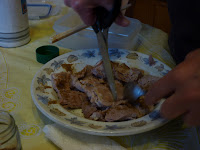I recently read an article in The Guardian relating to the terrible incident in Foshan: How can I be proud of my China if we are a nation of 1.4 bn cold hearts?. As recorded by CCTV camera, a total of 18 people walked by as Yue Yue, a two year old toddler, lay dying in the middle of the road. She had been hit by a truck and could be seen still alive, writhing in agony. And yet, yards away from their feet, her presence and distress did not even seem to register as these 18 people went about their own business. Seven minutes later a second vehicle ran over Yue Yue, crushing her to death.
The footage of this incident has since gone viral and has made national and international headlines. Grief, outrage and condemnation has been expressed by netizens all over the world and protests and vigils were held all over China in honour of Yue Yue's short life. But there is no denying the fact that this incident graphically exposes a terrible side to Chinese society; its moral fabric rotten to the core. For what happened on that day, although shocking and tragic, is just one incident of many. The author, Lijia Zhang, does not hold back. She defines with pin point accuracy the short comings and problems that engulf Chinese mentality. She is observant of the spiritual vacuum left behind now that the ideology of communism has been displaced. A new and frighteningly dark China is now fast emerging where morality, tradition and principle have been cast aside in favour for greed, selfishness and indifference.
After reading this article, I felt so sad - and embarrassed and angry. Here the British press like to run with the theme of a "Broken Britain" - a reference to the failings of British society - but I can honestly say that if a similar situation to Yue Yue's occurred on any street here, there would have been no hesitation whatsoever. If there were 18 people present at this scenario, 18 people would have rushed over to help or at least would have done something. It is innate, it is inbuilt in the culture. It is unthinkable to do anything else!
"We Chinese have every reason to feel proud about what we've achieved. Now we demand respect. But how can we possibly win respect and play the role of a world leader if this is a nation with 1.4 billion cold hearts?" That is a good question. Lijia Zhang refers to the existence of a law in parts of Europe in which its citizens must come to the aid of another in distress. This could only be a good thing. But such behaviours should not require a law - as people in general, all over the world have the natural capacity to care and look out for one another. It should not need this, or the tragic death of a child caught on CCTV to convince us to act like decent human beings.
Source: The Guardian
Also see:
Lijia Zhang



































